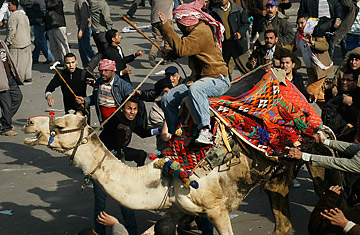
A supporter of embattled Egyptian president Hosni Mubarek rides a camel through the melee during a clash between pro-Mubarek and anti-government protesters in Tahrir Square on February 2, 2011 in Cairo.
(2 of 2)
Nevertheless, for thousands of demonstrators in the square, Mubarak's decision to manage his way toward retirement was unacceptable, and they flooded back into Tahrir, pledging to stay put as long as it took until he left office. On Wednesday, at a midafternoon press conference in the liberal Tomorrow Party headquarters, a collection of prominent opposition leaders — ranging from the Muslim Brotherhood to the liberal Wafd Party and the 6th of April youth movement — meeting under the banner of the National Coalition for Change firmly rejected the regime's proposal. "The demonstrations and the general strike will continue," the group members told the media. "We're not against negotiations, but negotiations will begin after Mubarak is gone," said George Ishak, a leader of the pro-democracy Kifaya ("Enough") movement and a member of the group.
Yet other opposition members decided on Wednesday that the concession would suffice and that they would be willing to negotiate with the regime in order to move the paralyzed country back toward normalcy and economic survival. These members represented the liberal Tagamu and Wafd parties as well as the nationalist Nasserist Party, according to the independent daily Al-Masry Al-Youm.
What's happening now is a dramatic polarization of the streets between pro- and anti-regime forces. And with this backdrop, the army's reputation for neutrality has become a device for political drama and maneuvering. "I think that the regime is using everything to maintain its continuity in power," says Hala Mustafa, editor in chief of the Al Ahram Quarterly Democracy Review, which is published by the government-funded Al-Ahram Center for Political and Strategic Studies. "And the neutrality of the army could be used from the regime to stay in power." It provides the regime with a way of denying the advantage of the streets to the protesters while keeping control of it. Says Mustafa: "As we saw, the army was neutral in the morning when they saw the other crowd arriving armed and on camels and everything. And they paved the way for them. And after that, they stayed neutral even as the battle turned bloody and finished."
Angry anti-regime demonstrators are now literally licking their wounds and planning ways to counter the Mubarak surge. "It's getting very crowded in here," shouts Marwa Nasser, an activist volunteering in a makeshift field hospital. "There are lots of face and head wounds," she says over the mayhem unfolding around her in a darkened side street of Tahrir Square. "They're beating them with stones and sticks, and it was all organized. They all came in at the same time, and some of them were thugs paid money to come here. Some are families of police officers."
If anything, she says, the experience has reinforced the activists' call for change. "No one is going home," she says. "We'll grow bigger, and it will continue without a doubt."
Would a peaceful show of support for Mubarak have undermined the persistence of the demonstrators in Tahrir? The point has become moot. For now, demonstrators who are either trapped by the violence or have chosen to remain in the center of the Egyptian capital after nightfall say the day's horror will only make their call for Mubarak's end more resolute. The violence, many believe, was orchestrated by the regime. And anger is boiling over.
